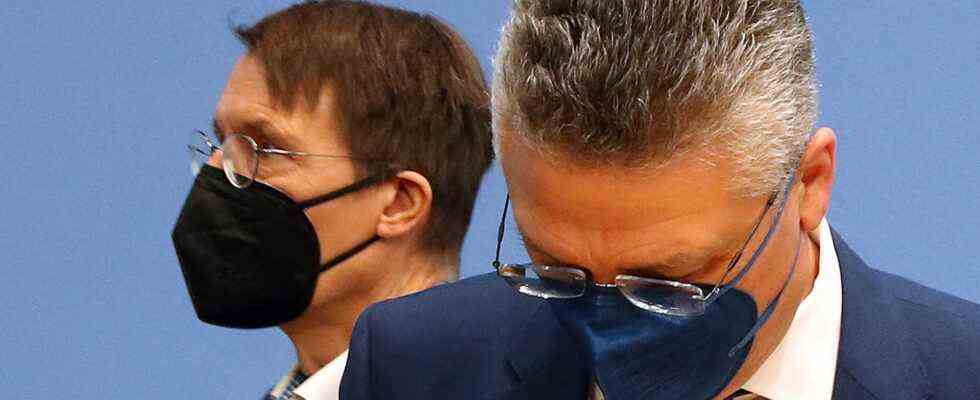Status: 08.02.2022 6:33 p.m
The debate about compulsory vaccination, criticism of RKI boss Wieler and the question of easing: Corona is currently causing unrest in the traffic light coalition. The Union is sharpening its profile in the opposition.
The worries are literally written all over the Minister of Health’s face today. “Traffic lights disagree over Wieler and Corona course”, such headlines should not please Karl Lauterbach. “Söder’s boycott” is another. Yesterday, the Bavarian Prime Minister announced that he would not initially implement the compulsory vaccination for employees in the health sector from mid-March. All of this puts a spanner in the works for the health minister.
Lauterbach said right at the beginning of the joint press conference that he was happy to have RKI boss Lothar Wieler by his side. Of course, he cannot avert the probing questions of the journalists.
The Minister of Health himself had already acknowledged communication problems. And the criticism hasn’t died down since the Robert Koch Institute changed the recovered status overnight in mid-January. Without warning. Many citizens lost their right to go to restaurants, bars or gyms almost overnight.
FDP criticizes Wieler
Not only from Lauterbach, but also from Chancellor Olaf Scholz there is support for the RKI boss. But the FDP continues to complain. General Secretary Bijan Djir-Sarai said Wieler could no longer be sure of the liberals’ trust. The party leader followed suit. The procedure was “extremely unfortunate”. Christian Lindner told RTL that he had “great doubts” about this decision – which was as unannounced as it was surprising.
The Greens, on the other hand, have been outraged for days at the actions of the smallest coalition partner. Janosch Dahmen, health policy spokesman for the Greens, tweeted: “Anyone who wants to govern a country responsibly should deal responsibly with their own executive. (…) That’s just not how you treat each other!”.
Controversy: when to relax?
The traffic light coalition has long been only superficially concerned with the Wieler personality. The background to the dispute becomes clear elsewhere: in the dissent between the SPD, FDP and Greens as to when there should be opening steps. Lindner had already called for relaxations such as the abolition of the 2G rule in retail last week.
The Minister of Health considers this to be premature. Relaxation before Easter is possible. But Lauterbach sees a rapid flattening of the Omicron wave in danger with a quick withdrawal. “We know the measures that protect us,” agrees the RKI President. You can rely on his top pandemic fighter when it comes to caution.
FDP at a distance from the coalition?
The fact that the FDP is meanwhile trying to distance itself from the Corona course of its own government coalition should reach the liberal base. It was also the demands for a relaxed corona policy that the liberals were able to score with in the federal election campaign. Some see it as a foretaste of the upcoming state elections.
The criticism was calculated, say observers. Just what does that mean for the coalition peace and the future of the traffic light government? In any case, this does not make Lauterbach’s work any easier. A journalist from Lauterbach wants to know why the FDP is sawing the chair of the RKI boss. He leaves that without comment, says the health minister taciturnly.
Union positions itself
Lauterbach could use a few traffic light coalitions. Because the Union blows on attack. Above all, the new CDU chairman Friedrich Merz wants to make a name for himself in the opposition. Although the CDU and CSU in the Bundestag and Bundesrat had agreed to a facility-related vaccination requirement in December, the about-face came yesterday.
Markus Söder, who was one of the first to introduce compulsory vaccination for certain professional groups, now wants to suspend enforcement with generous transitional regulations in Bavaria for the time being. The advance was coordinated with the CDU, it said a little later. The board and the executive committee agree: the federal government should suspend facility-related compulsory vaccination throughout Germany. There are fears of a massive outflow of staff.
Are the specifications missing?
Of course, the Minister of Health does not like that at all. The chaos is perfect. There is no uniform line from the countries. Some want to implement the facility-related vaccination requirement, SPD-led states such as Lower Saxony and Hamburg, for example. Countries in which the Greens (co-)govern, such as Baden-Württemberg and Schleswig-Holstein, also want to do the same.
Others have doubts and questions, such as Saxony-Anhalt and Saxony. From Hesse it is said that the federal government must immediately provide the federal states with more specific guidelines on how the facility-related compulsory vaccination should be implemented. North Rhine-Westphalia also sees problems with implementation.
The Minister of Health says he has not yet received any specific requests from the CSU or CDU for help with implementation in the federal states. However, implementation is a state matter. Lauterbach seems almost a bit helpless when he says that. He hopes for a solution. Of course, the federal government can help the states, for example by writing sample notifications for the health authorities that are supposed to check the vaccination requirement. It is questionable whether this assistance is sufficient for the countries.
Many construction sites for Lauterbach
Of course, giving up in the fight against the pandemic is out of the question for Lauterbach. He was “striving and ambitious that we can get through the Omicron wave”. He wanted to prevent a serious relapse in the fall. Also with the help of a general vaccination requirement. But even here there is no uniform line in the traffic light coalition.
Lots of construction sites for Lauterbach, from headwinds in their own government to cross-shots from countries and the now Union-led opposition. A mixed situation that should often cause the Minister great concern.

